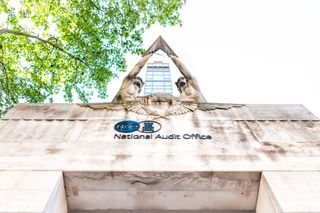UK gov criticised after £5bn in Bounce Back Loans paid to fraudsters
A National Audit Office report has also branded plans to recover 0.1% of stolen funds "inadequate"

The UK government “failed to put adequate fraud prevention measures in place” when launching the Bounce Back Loan Scheme, which intended to help SMBs weather the economic effects of the pandemic.
That's according to findings from the National Audit Office (NAO), which criticised the government for its plan to recover only £6 million over the next three years, out of the £4.9 billion of relief funds lost to scammers since the launch of the scheme in May 2020.
The target, which is around 0.1% of the stolen funds, has been deemed as “inadequate” by the NAO in a new report.
“Compared with the scale of its ‘most likely’ estimate of £4.9 billion of fraudulent loans, both the £32 million additional budget for counter-fraud operations, and its target to recover at least £6 million of fraudulent loans from organised crime, are inadequate,” the report concluded.
The criticism comes months after the Department for Business, Energy and Industrial Strategy found that more than one in ten (11%) of the accepted applications for the Bounce Back Loan had been fraudulent. The NAO noted that the figures, which were published in March 2021, “are highly uncertain”.
Commenting on the release of the report, NAO head Gareth Davies said that the government “prioritised getting Bounce Back Loans to small businesses quickly but failed to put adequate fraud prevention measures in place”.
“One impact of these decisions is apparent in the high levels of estimated fraud. The true level of fraud will become clearer over time, but it is clear [that the] government needs to improve on its identification, quantification and recovery of fraudulent loans within the scheme,” he added.
Get the ITPro. daily newsletter
Receive our latest news, industry updates, featured resources and more. Sign up today to receive our FREE report on AI cyber crime & security - newly updated for 2024.
The Bounce Back Loan Scheme was created to support businesses during the pandemic and offered loans of up to £50,000, or a maximum of 25% of annual turnover. More than 90% of the total £47 billion in loans, an estimated £39.7 billion, had gone to the smallest businesses, with a turnover below £632,000.
The Federation of Small Businesses’ (FSB) national vice chair Martin McTague told IT Pro that the high level of fraudulent loans was likely due to the fast pace of loan approvals:
“The government and British Business Bank were faced with an extremely difficult task: getting cash into as many of these small firms as possible, as quickly as possible, whilst rightly doing all they could to shut out fraudsters in a fast-moving situation. After weeks of the original interruption loan scheme simply not working for the smallest firms most in need, hold ups with the bounce back programme would have been catastrophic,” he said.
A spokesperson for the Department for Business, Energy and Industrial Strategy told IT Pro that it is “continuing to crack down on Covid-19 fraud and will not tolerate those that seek to defraud the British taxpayer”.
“We are working closely with lenders and enforcement authorities to minimise fraud and ensure those that have committed fraud face consequences,” they added.
Having only graduated from City University in 2019, Sabina has already demonstrated her abilities as a keen writer and effective journalist. Currently a content writer for Drapers, Sabina spent a number of years writing for ITPro, specialising in networking and telecommunications, as well as charting the efforts of technology companies to improve their inclusion and diversity strategies, a topic close to her heart.
Sabina has also held a number of editorial roles at Harper's Bazaar, Cube Collective, and HighClouds.






